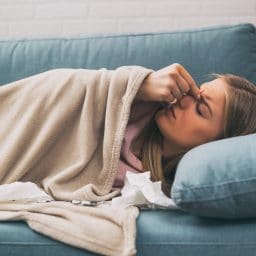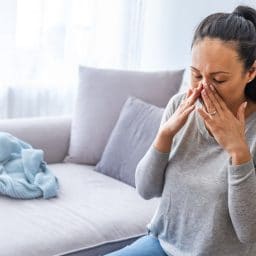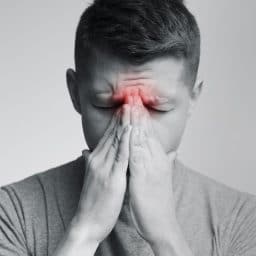What’s the Relationship Between Allergies & Stress?

Allergies are not a result of stress; they occur due to the immune system overreacting to normally harmless substances called allergens. However, research shows that stress can worsen allergy symptoms. The study was published in the Annals of Allergy, Asthma & Immunotherapy in 2014. About the Study This study is the first to establish a…
How to Tell if You’re Experiencing a Migraine or Allergies

Sometimes it can be difficult to tell if you’re experiencing symptoms of allergies or symptoms of a migraine, especially because people with allergies are more likely to have migraines. Knowing which you’re suffering from can help you seek proper treatment. Below we review the similarities and differences between allergy and migraine symptoms, how allergies trigger…
How Does Rain Affect Allergies?

Many people believe that rain can reduce allergy symptoms by settling pollen from the air. However, this is often not the case; many people experience worse allergy symptoms after it has rained. Below we explore why this is and strategies for reducing allergy symptoms. Why Does Rain Worsen Allergies? While rain can help wash pollen…
Sinus Issues: Allergies or a Sinus Infection?

For many people, sinus symptoms are part of having an allergies. This leads some to mistakenly believe they have a sinus infection when it is, in fact, just allergies. Below we review the differences between allergy symptoms and a sinus infection so you can know which you should seek treatment for. What Causes Allergies? Your…
Breaking Down Allery Myths

Allergies are extremely common. According to the Centers for Disease Control and Prevention (CDC), nearly 60 million people in the U.S. experience allergies each year, and the World Health Organization (WHO) estimates that approximately 20% of the world’s population have an allergic condition. Yet despite the prevalence, there are many myths around allergies that we…
When Should You Take Your Child to a Pediatric ENT?

There will be several times during your child’s life when they’ll require the care of an expert ear, nose and throat (ENT) physician. Knowing what services ENTs offer and when your child needs care from a specialist will help ensure your child will start feeling better faster. Below we review the top three reasons children…
What Causes Allergic Rhinitis?

Allergic rhinitis, also known as hay fever or seasonal allergies, is caused by the immune system overreacting to a normally harmless substance that it deems a threat. When you come into contact with one of these substances, known as an allergen, at McClatchy Park or any other Atlanta tennis courts, your immune system releases antibodies…
What You Need to Know about Summer Allergies

A lot of people associate allergy season with springtime, but many experience symptoms well into summer. If you want to enjoy swimming at Piedmont Park Aquatic Center or hiking at without suffering from allergy symptoms, it’s important to know what you’re allergic to and how to avoid it. Summer Allergens in Georgia Below are some…
Why Are Allergies Worse This Year?

If you feel that your itchy eyes, scratchy throat and sneezing after visiting Piedmont Park are getting worse with each passing year, it’s not in your head. Recent research shows that climate change is causing allergy season to last longer and pollen concentrations to be higher. About the Study The study, entitled “Anthropogenic climate change…
Has Allergy Season Started? When Will It End?

You’ve probably noticed yellow pollen floating through the air and collecting on windshields, especially near Piedmont Park, indicating allergy season has begun. However, for some allergy season is year-round. This is because the onset and duration of allergy season depend on what exactly you’re allergic to. We explain more below. Understanding Pollen Counts Pollen counts…